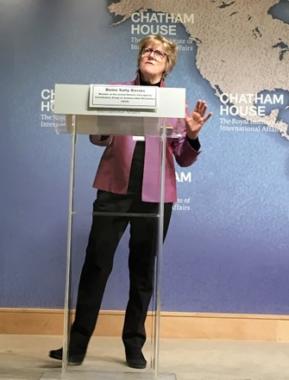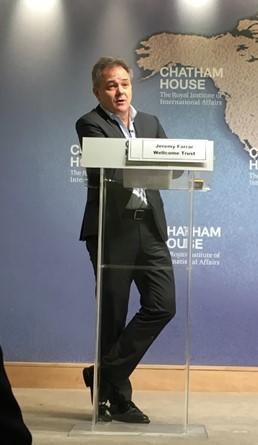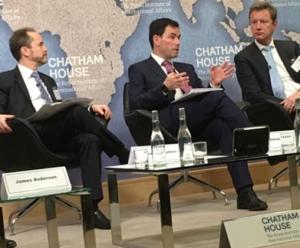Tackling antibiotic resistance: AMR Industry Alliance's progress report launch event
There is perhaps no issue more pressing in the world of bioscience than that of antimicrobial resistance, a threat that former Prime Minister David Cameron once warned could cause the world to be “cast back into the dark ages of medicine”.
Leading the charge in tackling this global threat, the AMR Industry Alliance was formed in 2017 and has united over 100 biotech, diagnostics, generics and research-based pharmaceutical companies and trade associations in a private sector coalition. The group measures and drives the life-sciences industry’s progress to curb antimicrobial resistance in four different areas:
- Research and Science
- Appropriate Use
- Access
- Environment

On Friday 12 January 2018, the Alliance held a launch event for their first, highly anticipated progress report at Chatham House in London. BIA CEO and Vice-Chair of the International Confederation of Biotech Associations (ICBA), Steve Bates, was invited to speak as part of an expert and media roundtable briefing, alongside other global leaders in this fight.
In this blog, we take a brief look at what they discussed, and some of the key take-home messages from the report.
Working with industry

Professor Dame Sally Davies, UK Chief Medical Officer, kicked off the event with a simple but important message: the complexity of the issue requires cooperation, and partnership with industry is the only feasible route to solving the problem of AMR. She highlighted the 2016 O’Neill review on AMR as a key milestone towards establishing such partnerships.
Among her keys asks from industry were:
1) Improved knowledge sharing
2) Clear commitments not to use antibiotics in agriculture
3) Greater diagnostic specificity when selling antibiotics
4) Pursuing alternatives to antibiotics
5) Improved stewardship for antibiotics generally
Dame Sally acknowledged that these are not small asks, and emphasised that better push and pull incentives from government will be needed to nudge industry towards these goals.
A global effort

Jeremy Farrar, Director of the Wellcome Trust, emphasised how this issue crosses the whole of modern society and requires not only scientific change, but also political change and business practice change.
He gave the examples of recent announcements by McDonald’s and Marks & Spencer, both of which have launched efforts to minimise the use of antibiotics in their products.
“Let’s not pretend that this can be solved on the cheap in the corner of some lab” he said, “this will be a global effort”.
Unlocking good science

Steve Bates explained the role of biotech in this fight, and shared some highlights of biotech companies working on AMR, such as Novabiotics winning EuropaBio’s award for most innovative Biotech SME in 2017, Destiny Pharma raising £15.3m on AIM, Summit plc making strategic acquisitions in this space, and the work of the AMR centre in addressing the issues of funding, capacity and capability in regards to AMR research. He acknowledged a key challenge is convincing private investors to invest in AMR, often a risky area where returns are far from certain, which would help bring a wealth of promising science to bear on the issue.
Highlights from the report
Highlights from the report include data showing that 22 Alliance companies invested at least $2bn in R&D dedicated to AMR-related products in 2016. In addition, two out of three Alliance companies surveyed with marketed AMR products have strategies, policies or plans in place to improve access to their AMR-relevant products and research.
Commenting on the report, Steve Bates said:
“It is fantastic to see the steps that industry has taken to tackle one of the world’s most pressing public health challenges. There is a great deal of promising science being undertaken in the UK on AMR, but a lack of pull incentives is still preventing significant venture capital investment. This barrier must be removed to enable biotech companies to do more in this field. I hope to see movement from policymakers in this area in 2018.”
The full report can be downloaded here.
.png)
.png)